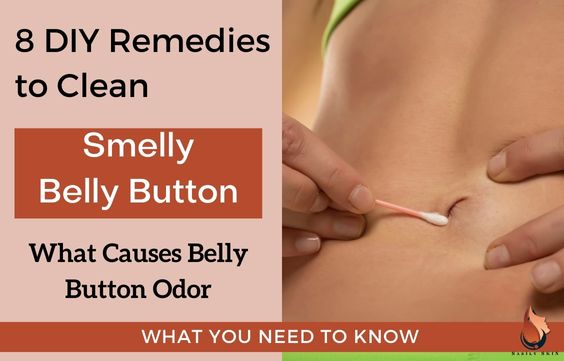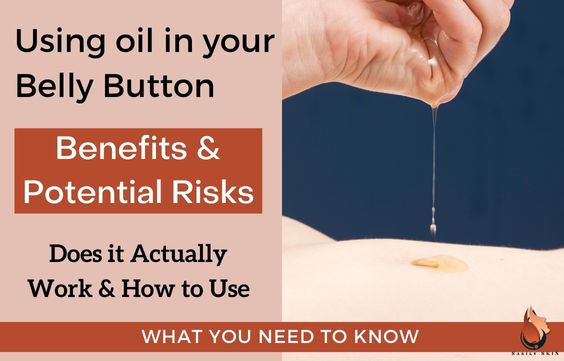8 DIY Remedies to Clean Smelly Belly Button

If you have a smelly belly button, you might be wondering what is going on, as you should!
So in this article, we are going cover the causes of belly button odor and 8 easy remedies to help deal with it.
What Causes A Smelly Belly Button
Generally, smelly belly buttons occur due to the build-up of dirt, sweat and bacteria, an infection, or other skin conditions like rashes, cysts, abscesses, etc.
How you manage this will depend on what is causing the smell but the first thing people usually do is try to clean the area. Sometimes all you need is a good cleaning, but sometimes, in the case of infections or skin conditions, you may need additional interventions.
These interventions can be DIYs or you may need medical attention depending on the severity of the issue.
Related Articles – Best Essential Oils for Your Belly Button & How to Use
How To Know If Your Smelly Belly Button Needs Medical Attention
If the cause of your smelly button is more serious, look for signs like:
- white, yellow, or green discharge
- bleeding
- swelling and redness or discoloration
- itching
- pain
- Scabs around the area or in your belly button
- fever
- a lump in your abdomen
If you experience any of these things, seek medical attention as soon as possible.
Related Articles:
Benefits & Risks of Using Oil in Your Belly Button
Best Oils For Your Belly Button- That Actually Work
DIY Remedies For A Smelly Belly Button
1- Clean Your Belly Button (Soap and Water)
One of the easiest ways to keep your belly button clean and stench-free is by practicing proper hygiene and keeping it clean. This is the easiest way to prevent dirt, sweat, and bacteria from building up.
Here is what to do:
- When in the shower, put a little bit of antibacterial soap on a washcloth.
- Using your index finger underneath the washcloth, clean the inside of your belly button using gently circular motions.
- Wash the soap out of the area well.
- After you get out of the shower, pat your belly button dry.
- Moisturize the area but do not use too much and try to use thin, easily absorbed moisturizers.
- If you have a belly button piercing, use soap and water to clean around the piercing every day and be sure to keep the area dry.
- If you have had abdominal surgery or have a wound in or around your belly button, clean the area and the wound according to your doctor’s instructions.
2- Use Saltwater
Saltwater, which is actually a saline solution, can be made at home and used to clean your belly button, keep it dry, and prevent bacterial infections.
Simply add 1 teaspoon of salt to 1 cup of warm distilled water or boiled water (let this cool before using it). Add a few drops to your belly button and let it dry naturally or use a clean cloth or gauze soaked in the solution to clean the area.
You can do this several times daily until you start seeing a difference.
Related Article – 7 Things You Should Never Put Inside Your Belly Button
3- Hydrogen Peroxide
Hydrogen peroxide has antimicrobial properties which can prevent bacterial and even fungal infections. It also dries the skin and prevents moisture build up which can help to quickly heal wounds and even cysts.
Mix 1 tablespoon of 3% hydrogen peroxide with 1-2 tablespoons of water. Soak a clean cotton pad in the solution and put it in or on your belly button. Allow it to dry naturally. Do this once daily.
4- White Vinegar
White vinegar has great antiseptic properties so it works really well for fighting infections of the skin, even in your belly button.
Mix 1 tablespoon of white vinegar with 2 tablespoons of water. Soak a clean cotton pad in the mixture and apply it directly to the affected area. You can use the pad to gently wipe the area and then use a new pad to cover the site for 15-20 minutes. Or you can skip the wiping altogether. It all depends on the condition of your skin. After the time has passed, wash the skin with clean water and pat dry.
You can do this 1-3 times daily until the infection starts to improve.
5- Rubbing Alcohol
Isopropyl alcohol disinfects and sterilizes the skin. It is best used for bacterial infections where the skin is not broken, however, as it can prevent wound healing. It is also very drying so it should not be used too often.
Apply a few drops of rubbing alcohol to a clean cotton pad and gently clean the area or lay it directly on the area and leave it to dry naturally.
Do this once or twice daily at most.
6- Aloe Vera
Aloe Vera has anti-inflammatory and antimicrobial properties. These properties can help in healing an existing belly button infection while also relieving inflammatory symptoms like pain, swelling, etc.
Try to get a fresh piece of aloe from a plan and extract some of the gel (use a spoon and gently scrape the inside of the leaf). Apply the gel directly to your cleaned belly button. Leave it on for 15-20 minutes and then wash it off.
You can do this 2-3 times daily.
7- Turmeric
Turmeric contains curcumin that exhibits powerful antimicrobial and anti-inflammatory properties. It can also speed up healing and reduce swelling, itching, and inflammation.
Mix 1 teaspoon of turmeric with enough water to form a smooth paste. Apply the paste directly to your belly button and let it dry. When dry, use a clean, damp cloth to wipe it off or rinse it off with clean water.
Do this at least once daily.
8 – Tea Tree Oil
Tea Tree essential oil has antifungal, antibacterial, and anti-inflammatory properties. These properties can help kill the infection-causing microbes and provide relief from itching, swelling, and pain.
Mix 2-3 drops of tea tree oil with 1 teaspoon of coconut oil. Apply it directly to your belly button. Leave it on for 15-20 minutes and then wipe it off.
You can do this 2-3 times daily for fast results.
Related Article – Best Essential Oils for Your Belly Button & How to Use
Disclaimer
Please keep in mind that these home remedies are for mild belly button infections or conditions. They may not work as well for everyone, especially if the cause of your smelly belly button is more severe.
If you use these remedies and the condition gets worse or does not improve in a week, then you should seek medical attention.




